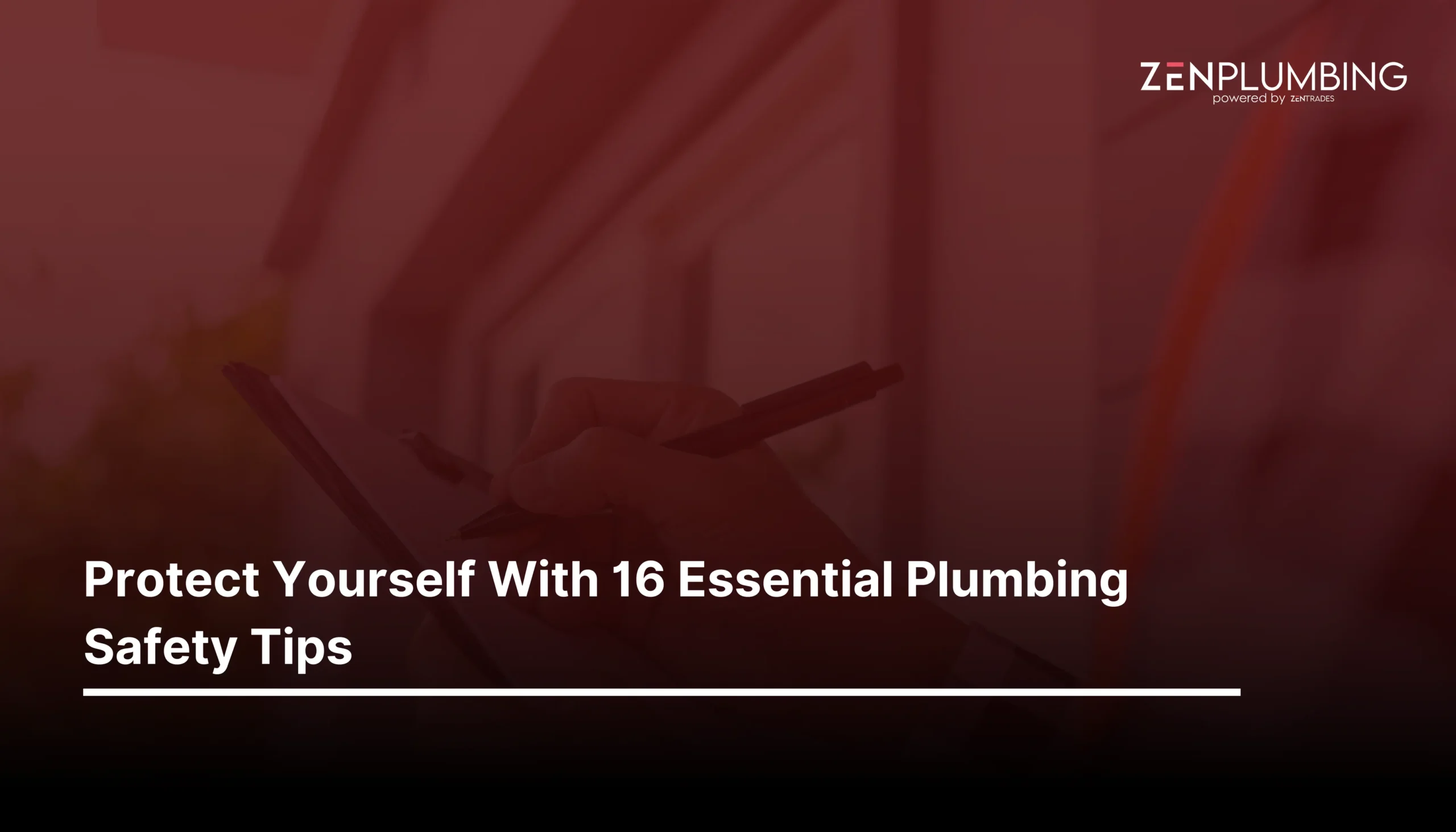Protect Yourself With 16 Essential Plumbing Safety Tips
- Field Service Management
- 9 Min Read
Safety plays a massive role in plumber training and should be a top priority throughout practice—an ultimate focus of study from the first day of class to your last day as an apprentice.
Plumbers work with specialized equipment in uncomfortable circumstances, in challenging environments, and with potentially dangerous materials.
The typical plumber’s yearly salary is $61,100, or $29.37 per hour, and the plumbing industry in the United States generates 124 billion dollars in sales each year.
Businesses must provide rapid and effective plumbing solutions to meet the growing number of client requests as the industry scale grows to maximize their employees’ labor time.
But in a rush to produce speedy results, the plumbing process’s security may be jeopardized, raising the possibility of mishaps and losses.
You can protect yourself from most potential risks using common sense and a healthy dose of precautions.
However, several plumbing safety tips you can learn about in this article will be essential to your safety at work.
Here What We Cover
Risks and Hazards in Plumbing
Plumbers are responsible for disposing of or removing waste properly. The fact that the water we drink is not tainted with harmful chemicals results from their work and saves many lives.
We must always put plumber safety and health as a high priority and protect them from risks and hazards like the ones given below:
- Exposure to potentially harmful substances, including lead, mold, asbestos, chemicals, raw sewage, and sulfur dioxide
- Falls and trips due to leaks and other moist working circumstances
- hearing loss brought on by piercing noises made by plumbing equipment, pipelines, or tools
- Working with plumbing equipment and power tools might result in cuts, fractures, or broken bones.
- Work on metal pipes causes an electric shock.
- Hot water, steam, or power tool burns
- Working in inconvenient locations and repetitive motions can cause musculoskeletal ailments.

Use our free estimate template now
Make winning quotes in minutes—for any industry and any job.
Plumbing Safety Tips: The Do’s and Don’t’s
During the analysis and plumbing processing that takes place on-site, plumbing teams should remain careful.
A disaster scenario and a straightforward project management scenario can be distinguished by the plumbers’ ability to analyze the issue properly.
Assuring that plumbers provide a secure and remarkable customer experience requires plumbers to train themselves to adhere to these plumbing safety tips.
Plumbers should adhere to the following plumbing safety Do’s and Don’t’s to prevent mishaps.
8 Plumbing Safety Tips: Do’s
For a job well done, and a safe service for both plumbers and customers, technicians should:
1. Take precautions against Electrical and Fire Risks
Fire-prone items, water, and electricity should not be combined. Watch out for any gas or electrical components that might be attached to the plumbing component you’re working on. Or you’re working close to an electrical source. Close all gas and power lines before you begin, and lockout and de-energize any equipment before you start working on it.
2. Carry Protection for Burns
Two typical risks for plumbers are boiling water and scorching steam. Plumbers should wear heat-insulating gloves and face/eye protection when working on hot pipes. Additionally, remember to drain pipes before opening them.
3. Frequently wash your hands
Remember that as a plumber, you come into touch with various pollutants and substances, including dust, mold, and wastewater. A simple yet incredibly efficient strategy to control exposure to those elements is washing your hands regularly and thoroughly. Additionally, it will lessen the likelihood that you will infect your loved ones, clients, and coworkers with germs and pathogens.
4. Advance Preparations for a Job
For technicians to properly prepare for plumbing repairs, approach each project with initiative. Technicians should have the appropriate equipment, training, and abilities for job-related safety and effective customer service. A plumber will frequently be familiar with the solution to the problem even before they start the task.
5. Carry the Correct Tools
Technicians must work effectively with the best plumbing tools and a tidy, organized vehicle. The tread depth of the van’s tires is just one factor that companies use to rate technicians. A technician can securely handle the plumbing job with the help of a fully loaded van instead of a subpar or risky tool. Driving back to the shop saves time, fuel, and the additional chance of an accident.
6. Get Business Insurance
Plumber insurance safeguards your business from unforeseen events despite your best efforts to reduce risks. General liability insurance will shield your business from liability claims if your job damages customer property or bodily injury, you need a liability insurance which covers all.. Most states mandate workers’ compensation insurance, which guarantees that if an employee is hurt at work, they will receive medical attention and lost salary benefits. Additionally, it typically defends a business in court and gives your clients the same security.
7. Create a Policy for Health and Safety
A crucial first step in establishing a workplace safety program is developing a health and safety policy for your plumbing business. Included in your health and safety policy should be: emergency measures and first aid, Reporting and investigative processes for accidents, general site regulations to provide a secure working environment, and a plan for responding to fire emergencies.
8. Regularly Check your Plumbing Equipment
You may prevent mishaps or injuries from unsafe equipment by keeping your plumbing tools in good shape. For your plumbing van, this should involve routine upkeep and fuel replenishments.
8 Plumbing Safety Tips: Don’t’s
To avoid injuries both short and long-term, technicians, Don’t:
1. Take Risks with Chemicals
Workplace Hazardous Materials Information System instruction is mandatory and teaches aspiring plumbers how to recognize typical chemicals they employ.
Understanding how to read the warning symbols on chemicals that alert you to toxicity, flammability, and reactivity is essential. Additionally, instruction is provided to students on safe product handling, storage, and use.
2. Neglect Safety Training
By spending money on plumber safety training, you can prioritize workplace safety. Consider compulsory safety training when choosing the themes for your team’s plumbing safety meeting.
This way, everyone knows the most recent safety precautions and standards and understands how vital safety is to your business.
Plumbers must keep their skills current through on-the-job training and ongoing education. They also need the necessary safety supplies and tools to do their duties properly.
3. Misuse Plumbing Tools
Your team should utilize robust equipment and do-it-yourself plumbing tools to get the desired outcomes. They ought to refrain from using the equipment in a way that endangers others or causes damage. Regular maintenance checks should be incorporated into the ecosystem to boost the effectiveness of the tools and assist you to provide clients with a quality plumbing experience.
4. Consume food or drinks on job sites
On a construction site, you should never eat or drink. This is not the place for a snack with all the chemicals, waste materials, and toxins on the surfaces and in the air. Only in designated clean areas and only after changing into clean clothes and doing their dishes should plumbers dine.
5. Work in Inconvenient and Confined Spaces
Plumbing operations must be performed in a suitable area to provide high-quality outcomes. Your team shouldn’t work in small spaces because doing so increases the risk of mishaps and harm. It may lower the standard of plumbing services and present different difficulties for your plumbing team in providing the needed assistance.
6. Work near Electrical Wiring
When managing various plumbing operations at commercial or residential properties, your team must steer clear of diverse electrical wirings on the project site. They should avoid performing plumbing operations adjacent to an electric circuit to reduce the danger of accidents and injuries.
7. Work Blindly
Your crew should know what is concealed before drilling or cutting into a ceiling, wall, or floor hollow. Before using power tools for plumbing work, examining any cavities containing electrical wiring, pipes, or other ducting is advisable before using power tools for plumbing work.
8. Ignore Safety Data Sheets
Your understanding of the health risks associated with the chemicals you’re handling and the protective equipment you’ll need to control them safely is aided by safety data sheets. Plumbers should always have access to these sheets.
Get posts like this in your inbox.
Keep learning how to run a 5-star business with our bi-weekly newsletter.
Plumber Personal Protective Equipment
With the proper safety equipment, a plumber can work safely. On the job site, safety is ensured by wearing the appropriate clothing, eyewear, ear plugs, respirators, boots, hats, work gloves, and other accessories.
Professional plumbers might experience, among other health risks:
1. Safety Eyewear
You can protect your eyes by wearing safety glasses from flying debris, boiling water, or chemical splashes. When working with powerful instruments or severe chemicals, wear eye protection. Pro Tip: Regarding job site safety, safety, and prescription glasses are not equivalent. Find a pair of protective glasses that will fit snugly over your prescription glasses if you wear them.
2. Plumbing Gloves
Protecting your hands from cuts, burns, chemicals, biohazards, and other hazards is crucial because they are one of your most vital plumbing tools. To shield your hands from all dangers, you must spend money on various plumbing gloves, such as nitrile and leather.
3. Plumbing Boots
Common causes of workplace accidents are trips, slips, and falls. For all tradespeople, plumbers must invest in high-quality, slip-resistant plumbing boots with a protective toe box. Consider installing rubber mats around your work area to lessen the risk of falls caused by water puddles.
4. Masks
A mask can protect Your lungs from harmful substances at work. It is best to use a respirator mask while working with compounds that could be harmful, such as mold or asbestos. On the other hand, dust masks will shield you from non-toxic dust brought on by unclean work conditions or cutting pipes. Using a face mask in a customer’s house can help protect you from any airborne diseases.
5. Protective Earplugs
The majority of people are unaware that plumbers frequently work in loud settings. High noise levels produced by industrial areas and construction sites can harm hearing adversely. One study found that 48% of plumbers had hearing loss to some extent during their careers. So keep your earplugs close at hand.
6. Plumbing Suits
Canadian Centre for Occupational Health and Safety instructs us to put plumbing clothes in a plastic bag, laundering them separately from other clothing, and changing them before leaving the job site while handling sewage.
Here is why;
If you are handling sewage, you have probably come into contact with waste or polluted soil, which has probably landed on your work clothes.
You practically become a walking biohazard if you wear those same clothes to go home. These pollutants will follow you around and get on other people.
Potentially harmful parasites, funguses, viruses, and bacteria thrive in sewage pipes and septic tanks.
Allow ZenPlumbing to Optimize your Business
You may get real-time information from your on-the-ground staff with the excellent field service management tool ZenPlumbing. Improve communication between management and the workers on the ground to streamline the operations of your plumbing company.
The ZenPlumbing software runs well, making it more straightforward for your staff to adjust to the new integration in your current business ecosystem.
You may assess the state of your business and make necessary adjustments for the best possible growth by analyzing real-time data.
Plumbers who are overworked and worn out frequently create dangerous circumstances. As your company’s earnings increase, strategically upgrade your tools while monitoring technician workloads.
Book a free demo and grow your business!

Explore a better way to grow your business. Book a free demo now!
Get organized, win jobs, and wow customers.
Book A Free Demo with ZenTrades Today!
Related Reading
Why Your Field Software Management Software Needs QuickBooks Integration
ZenTrades Why Your Field Service Management Software Needs QuickBooks Integration Read More Request Demo...
Read MoreZenTrades How To Manage Electrical Service Agreements Like...
Read MoreZenTrades The Best 5 Jobber Alternatives In 2023...
Read More

